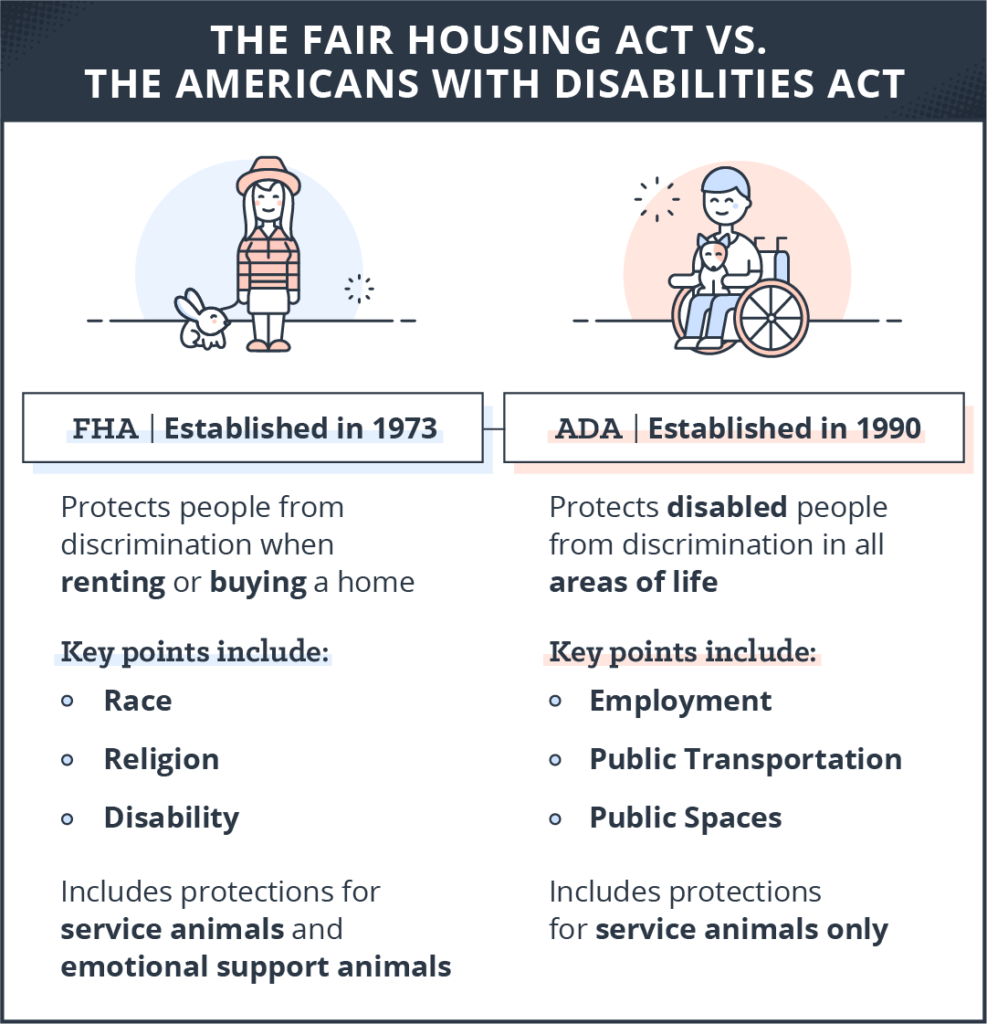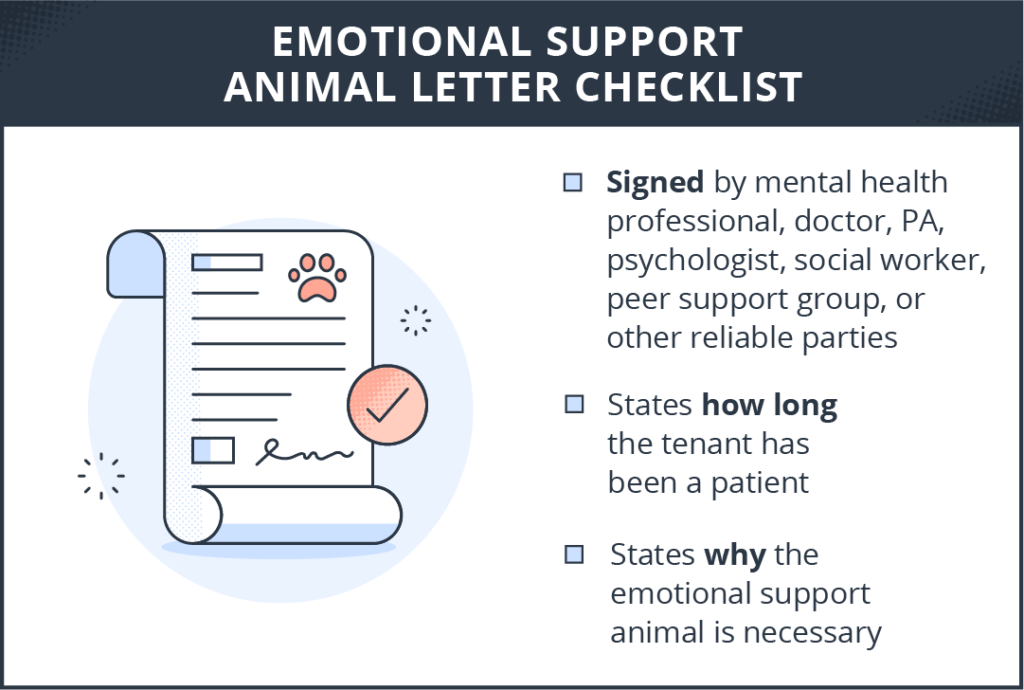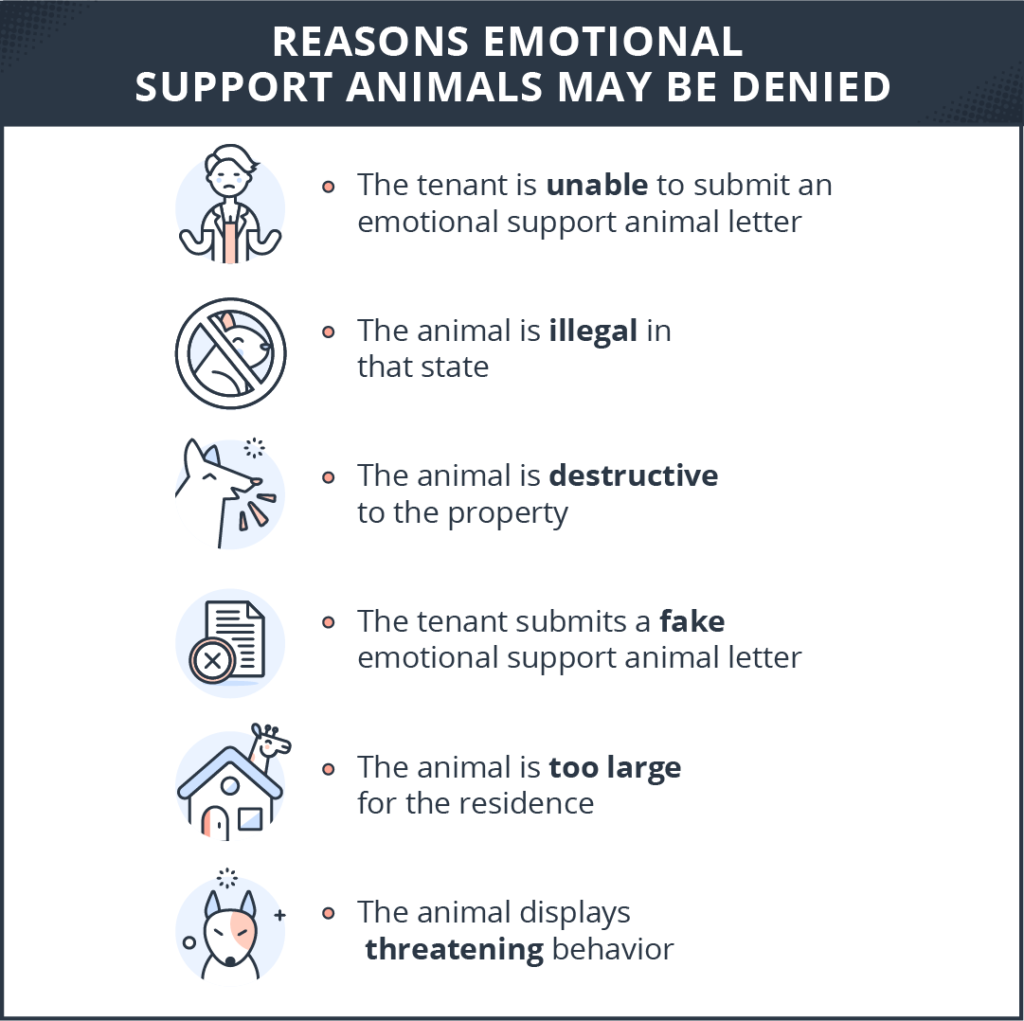Understanding emotional support animal (ESA) laws can be tricky. Do they qualify as pets or service animals? The answer is somewhere in between. There are certain ESA laws that grant legal protections for these animals and their owners, but not as many as service animals enjoy.
Conversations about emotional support animals can be challenging for both tenants and landlords, so it’s important to understand Fair Housing Laws and have patience when negotiating. Below is a complete guide to everything you need to know about ESA laws as a landlord.

What Is an Emotional Support Animal?
Emotional support animals are companions that help treat depression, anxiety, and a number of related mental health challenges.
Emotional Support Animal vs. Service Animal: What’s the Difference?
The key difference between an ESA and a service animal is that ESAs are not specifically trained to do a job that their owner can’t perform on their own; ESAs provide companionship and emotional care. Additionally, ESAs:
- Are protected by the Fair Housing Act
- Do not require any specific training
- Must be accompanied by a note from a licensed mental health professional to qualify for rent-free and fee-free housing
In contrast, service animals are seen legally as medical equipment. They are:
-
Trained to perform an essential function for their owners who need assistance due to physical, mental, or emotional disabilities
-
Given extensive legal protections by the Fair Housing Act and the Americans with Disabilities Act
-
Require rigorous training to provide medical services to a person with a disability
As long as an ESA can be reasonably accommodated within a home and doesn’t cause a disturbance to others, they can be any type of common household animal. That said, humans have been known to bond with a wide variety of creatures, and some of the more unique emotional support animals to date include llamas, alligators, and peacocks! Watch our free ESA Webinar to learn more.
Did You Know?:
Legal Protections for Emotional Support Animals and Service Animals
ESA laws provide fewer legal protections than service animals enjoy. However, ESAs are classified differently than regular pets and are given certain legal privileges under the Fair Housing Act. Let’s break down how the Fair Housing Act and the American Disabilities Act protect the medical animals that might be moving into your rental.

The Fair Housing Act
Under the Fair Housing Act, landlords may not turn away tenants who have an emotional support animal. Even if the apartment is under a “no pets” policy, landlords are still required to make reasonable accommodations for the emotional support animal.
Learn more about the Fair Housing Act to avoid catching a discrimination charge in this Fair Housing for Landlords course.
Pro Tip:
The Americans with Disabilities Act
The Americans with Disabilities Act (ADA) protects disabled persons from discrimination in all areas of their lives. The ADA only provides protections for service animals that provide essential care for disabled humans, therefore emotional support animals are not protected by ADA regulations.
When renting with a disability, a service animal is just one part of the conversation. There are additional factors to consider, like what qualifies as a disability.
Applying to Rent With an Emotional Support Animal
If a tenant applies to live in a no-pets rental with an ESA, they must be able to show proof that they own a medically prescribed emotional support animal by providing an ESA housing letter.
Emotional Support Animal Housing Letter Checklist

An ESA housing letter is a signed statement from the tenant’s mental health practitioner proving that the animal companion is essential to their wellbeing and recovery. The letter can be signed by a doctor, PA, psychologist, social worker, peer support group, non-medical service agency, or a reliable third party that would be aware of the condition and can attest to the needs of the individual. Some landlords may also have their own paperwork that will need to be filled out by the tenant and their mental health practitioner.
There are specific ESA letter requirements that must be met in the documentation provided by the tenant, including:
- The signature of a medical professional, social worker, peer support group, or another reliable party
- A statement indicating how long the tenant has been a patient/group member
- An explanation of why the ESA is necessary
Tenant Protections Under the FHA
Under the FHA, tenants and their emotional support animals are protected from the following:
- Landlords cannot require the emotional support animal to undergo any specific training.
- Landlords cannot refuse housing to the tenant even if their property insurance doesn’t cover emotional support animals.
- Landlords cannot ask tenants to pay any extra rent or deposits for having the emotional support animal, though it should be noted that they can require payment for any damage done by the animal.
What If the Landlord Doesn't Comply With an ESA Housing Letter?
Renting to a tenant with an emotional support animal, especially in a no-pets unit, can be a trying experience for both parties. It’s important to communicate respectfully and make sure you have all the necessary background information as detailed in the ESA housing letter. If the tenant has talked to the landlord about their protections under the FHA and the landlord continues to refuse them housing:
- The tenant may sue the landlord for discrimination.
- The tenant may also file a complaint with the U.S. Department of Housing and Urban Development (HUD), the organization that oversees the FHA.
This is an undesirable outcome for all involved, so it’s always best to try to reach an agreement before escalating the situation.
Can Landlords Deny ESAs?
Landlords are only required to make reasonable accommodations to emotional support animals. There are a number of circumstances in which a landlord may reasonably deny an emotional support animal.

When Can a Landlord Legally Reject an ESA?
- The tenant is unable to submit an ESA housing letter
- The animal is illegal to own in that state
- The ESA is destructive to the property
- The tenant submits a fake ESA housing letter
- Unfortunately, bad actors might try to fake emotional support animal letters, so it’s important for tenants to have their letters signed and dated on the official office letterhead of their mental health/medical practitioner.
- The animal is too large for the residence
- Landlords may deny animals that are overly large and will not be housed humanely in the unit. An example of this would be an emotional support horse living in a 17th-story apartment.
- The animal displays threatening behavior
- If the emotional support animal is scaring other residents or even putting them in danger, it’s the landlord’s duty to protect the residents by making sure the animal leaves the property. Other tenants have the right to feel safe and secure, so it’s important to make sure emotional support animals are on their best behavior.
Emotional Support Animal and Service Animal Laws FAQs for Landlords
Can a Landlord Ask About a Tenant’s Disability?
No, a landlord may not ask about the tenant’s disability or their treatment plan. This is one of the protections stipulated by the FHA.
Can a Landlord Ban an Emotional Support Dog Based on Breed?
Again, no — the landlord cannot deny housing based on specific dog breeds. If the emotional support dog is too large for the space, poses a threat to other residents, or causes damage to the unit, then the landlord may take action.
Can a Tenant Have Multiple Emotional Support Animals?
Yes, a tenant may have multiple emotional support animals. Each would need to have its own ESA housing letter, and each would be evaluated separately to see if they meet reasonable accommodation standards.
Do Landlords Have to Accept Emotional Support Animals?
If the landlord receives a housing letter that meets the ESA letter requirements, they must make reasonable accommodations to accept the emotional support animal.
Can Landlords Charge for Emotional Support Animals?
Landlords cannot ask tenants to pay any extra rent or deposits for having an emotional support animal, though it should be noted that they can require payment for any damage done by the animal.
Emotional Support Animal Resources
The following organizations and documents are great resources for answering any additional questions when it comes to ESA laws and apartment renting:
Conclusion
ESA laws can present a frustrating gray area, as their legal protections are in between regular pets and service animals. However, landlords and tenants should remember the rule of reasonable accommodation and try to work together to solve any rental issues.
Compromising with renters is easy with TurboTenant’s instant messaging and automatic check-ins. Plus, we store all important documents for you, like an ESA letter. Sign up today to simplify your tenant-landlord relationship.
DISCLAIMER: TurboTenant, Inc. does not provide legal advice. This material has been prepared for informational purposes only. All users are advised to check all applicable local, state, and federal laws, and consult legal counsel should questions arise.







